

Jealousy. Jealousy and Flirtation depicts a woman jealous (or, more narrowly, envious) of the attention given to another woman by a man.
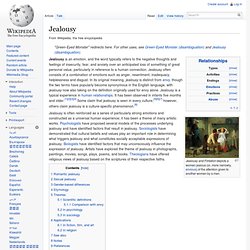
Jealousy is an emotion, and the word typically refers to the negative thoughts and feelings of insecurity, fear, and anxiety over an anticipated loss of something of great personal value, particularly in reference to a human connection. Jealousy often consists of a combination of emotions such as anger, resentment, inadequacy, helplessness and disgust. In its original meaning, jealousy is distinct from envy, though the two terms have popularly become synonymous in the English language, with jealousy now also taking on the definition originally used for envy alone. Jealousy is a typical experience in human relationships.
It has been observed in infants five months and older.[1][2][3][4] Some claim that jealousy is seen in every culture;[5][6][7] however, others claim jealousy is a culture-specific phenomenon.[8] Jalousie. Un article de Wikipédia, l'encyclopédie libre.
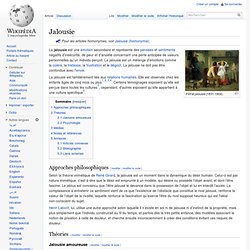
Flirt et jalousie (1831-1904). La jalousie est une émotion secondaire et représente des pensées et sentiments négatifs d'insécurité, de peur et d'anxiété concernant une perte anticipée de valeurs personnelles qu'un individu perçoit. La jalousie est un mélange d'émotions comme la colère, la tristesse, la frustration et le dégoût. La jalousie ne doit pas être confondue avec l'envie. La jalousie est familièrement liée aux relations humaines. Approches philosophiques[modifier | modifier le code] Selon la théorie mimétique de René Girard, la jalousie est un moment dans la dynamique du désir humain.
Théories[modifier | modifier le code] Jalousie amoureuse[modifier | modifier le code] La jalousie amoureuse est une émotion empreinte d'agressivité qui est la conséquence de la peur de perdre l'être aimé ou l'exclusivité de son amour, au profit d'une autre personne – sentiment qui peut être fondé sur l'imagination et non sur des faits[7]. P. Anxiété. Un article de Wikipédia, l'encyclopédie libre.
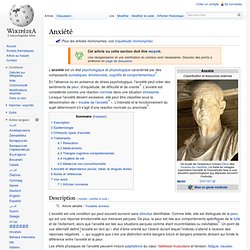
L’anxiété est un état psychologique et physiologique caractérisé par des composants somatiques, émotionnels, cognitifs et comportementaux[2]. En l'absence ou en présence de stress psychologique, l'anxiété peut créer des sentiments de peur, d'inquiétude, de difficulté et de crainte[3]. L'anxiété est considérée comme une réaction normale dans une situation stressante. Lorsque l'anxiété devient excessive, elle peut être classifiée sous la dénomination de « trouble de l'anxiété[4] ». L'intensité et le fonctionnement du sujet déterminent s'il s'agit d'une réaction normale ou anormale[5]. Description[modifier | modifier le code] L'anxiété est une condition qui peut souvent survenir sans stimulus identifiable. L'anxiété n'inclut pas seulement des effets physiques mais aussi des effets émotionnels. Anxiety. Signs and symptoms[edit] A job applicant with a worried facial expression Although panic attacks are not experienced by every person who suffers from anxiety, they are a common symptom.
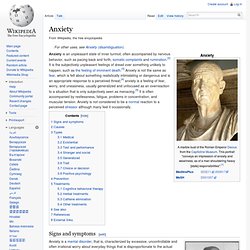
Panic attacks usually come without warning and although the fear is generally irrational, the subjective perception of danger is very real. A person experiencing a panic attack will often feel as if he or she is about to die or lose consciousness. Nervous habits such as biting fingernails The behavioral effects of anxiety may include withdrawal from situations which have provoked anxiety in the past.[14] Anxiety can also be experienced in ways which include changes in sleeping patterns, nervous habits, and increased motor tension like foot tapping.[14] The cognitive effects of anxiety may include thoughts about suspected dangers, such as fear of dying.
Envy. Portrait of a Woman Suffering from Obsessive Envy; Jean Louis Théodore Géricault (1791–1824) Envy (from Latin invidia) is an emotion which "occurs when a person lacks another's superior quality, achievement, or possession and either desires it or wishes that the other lacked it"[1] Bertrand Russell said that envy was one of the most potent causes of unhappiness.[2] Not only is the envious person rendered unhappy by his envy, but they also wish to inflict misfortune on others.
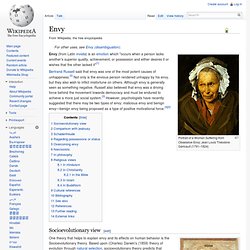
Although envy is generally seen as something negative, Russell also believed that envy was a driving force behind the movement towards democracy and must be endured to achieve a more just social system.[3] However, psychologists have recently suggested that there may be two types of envy: malicious envy and benign envy—benign envy being proposed as a type of positive motivational force.[4][5] Envie. Un article de Wikipédia, l'encyclopédie libre.
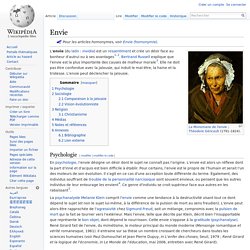
L’envie (du latin : invidia) est un ressentiment et crée un désir face au bonheur d'autrui ou à ses avantages[1],[2]. Bertrand Russell explique que l'envie est la plus importante des causes de malheur morale[3]. Elle ne doit pas être confondue avec la jalousie, qui induit le mal-être, la haine et la tristesse. L'envie peut déclencher la jalousie. Psychologie[modifier | modifier le code] En psychologie, l’envie désigne un désir dont le sujet ne connaît pas l’origine.